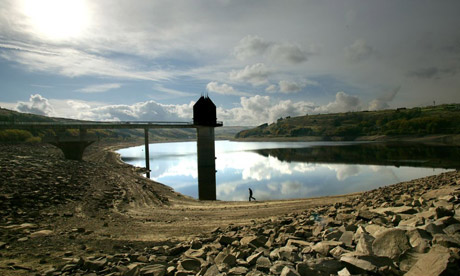10 August 2007Ian Sample
 Dried up … low water levels at Scammonden dam, West Yorkshire in summer 2003. Photograph: Don McPhee
Dried up … low water levels at Scammonden dam, West Yorkshire in summer 2003. Photograph: Don McPheeBritish scientists are predicting a succession of record-breaking high temperatures in the most detailed forecast of global warming's impact on weather around the world.
Powerful computer simulations used to create the world's first global warming forecast suggests temperature rises will stall in the next two years, before rising sharply at the end of the decade.
From 2010, they warn, every year has at least a 50% chance of exceeding the record year of 1998 when average global temperatures reached 14.54C.
The study's findings raise the prospect of hotter summers and episodes of torrential rain in the UK; 1998 brought temperatures peaking at 32.2C, although the UK record was set in 2003 at 38.1C.
The forecast from researchers at the Met Office's Hadley Centre in Exeter reveals that natural shifts in climate will cancel out warming produced by greenhouse gas emissions and other human activity until 2009, but from then on, temperatures will rise steadily. Temperatures are set to rise over the 10-year period by 0.3C. Beyond 2014, the odds of breaking the temperature record rise even further, the scientists added.
The forecast of a brief slump in global warming has already been seized upon by climate change sceptics as evidence that the world is not heating. Climate scientists say the new high-precision forecast predicts temperatures will stall because of natural climate effects that have seen the Southern Ocean and tropical Pacific cool over the past couple of years.
The forecast marks a shift in thinking by climate change researchers. Instead of using their models to look many decades ahead, they will focus on the very near future. The hope is that forecasts will be more useful to emergency planners in governments and companies by warning of droughts and other extreme conditions a year or two ahead. Previously, the models have been used to show that global temperatures may rise 6C above pre-industrial levels by 2100.
"If you look ahead on a 50- to 100 year time frame, then global warming is the big thing for the climate, but if you're working on a project that is only designed to last for the next few years, that information doesn't make much difference to you," said Doug Smith, a climate scientist at the Hadley Centre.
http://www.guardian.co.uk/environment/2007/aug/10/weather.uknews?gusrc=rss&feed=science






